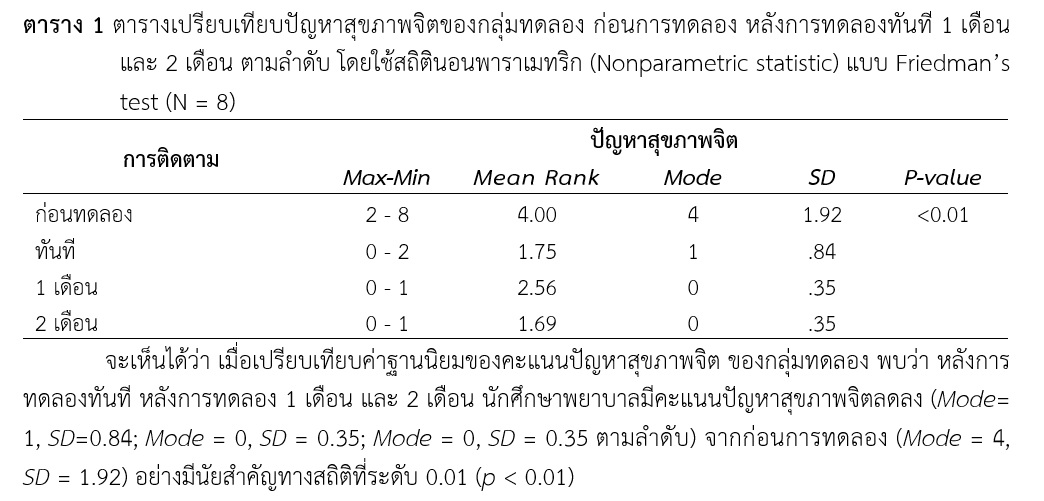ผลของการให้การปรึกษารายกลุ่มแบบผู้รับบริการเป็นศูนย์กลาง ต่อสุขภาพจิตและความสุขของนักศึกษาพยาบาล คณะพยาบาลศาสตร์ มหาวิทยาลัยสงขลานครินทร์
คำสำคัญ:
การปรึกษารายกลุ่มแบบผู้รับบริการเป็นศูนย์กลาง, ภาวะสุขภาพจิต, ความสุข, นักศึกษาพยาบาลบทคัดย่อ
การวิจัยกึ่งทดลองแบบสองกลุ่มด้วยวิธีวัดซ้ำก่อนและหลังการทดลอง เปรียบเทียบระหว่างช่วงเวลา (Two-Group Repeated Measure Designs) เพื่อศึกษาผลของการให้การปรึกษารายกลุ่มแบบผู้รับบริการเป็นศูนย์กลาง ต่อภาวะสุขภาพจิต และความสุข โดยวัดผลทันที และวัดซ้ำ 1 เดือน และ 2 เดือน ของนักศึกษาพยาบาลคณะพยาบาลศาสตร์ มหาวิทยาลัยสงขลานครินทร์ กลุ่มตัวอย่าง เป็นนักศึกษาพยาบาลชั้นปีที่ 3 จำนวน 15 คน แบ่งเป็นกลุ่มทดลอง จำนวน 8 คน และกลุ่มควบคุม จำนวน 7 คน รูปแบบการให้การปรึกษารายกลุ่มแบบผู้รับบริการเป็นศูนย์กลาง พัฒนาจากทฤษฎีการให้การปรึกษาของคาร์ล อาร์ โรเจอร์ส ร่วมกับการปรึกษารายกลุ่มของโอลเซ็น และการทบทวนวรรณกรรม ดำเนินการให้คำปรึกษาทั้งหมด 4 ครั้ง ครั้งละ 90-120 นาที เครื่องมือที่ใช้ในการวิจัย ประกอบด้วย แบบบันทึกข้อมูลส่วนบุคคล แบบสอบถามปัญหาสุขภาพจิตทั่วไป แบบสอบถามความสุขของคนไทยฉบับสั้น ซึ่งผ่านการตรวจสอบจากผู้ทรงคุณวุฒิ จำนวน 3 คน ทดสอบความเที่ยงของแบบสอบถามปัญหาสุขภาพจิตทั่วไป แบบสอบถามความสุขของคนไทยฉบับสั้น โดยหาค่าสัมประสิทธิ์แอลฟ่าครอนบาคได้ เท่ากับ 0.77, 0.85 ตามลำดับ วิเคราะห์ข้อมูลโดยใช้ค่าความถี่ ค่าต่ำสุด ค่าสูงสุด ค่าเฉลี่ย ค่าเบี่ยงเบนมาตรฐาน สถิตินอนพาราเมทริกซ์ แบบฟรีดแมน และสถิติครัสคอล วอลลิส พบว่า
1. กลุ่มทดลองมีคะแนนปัญหาสุขภาพจิตลดลงหลังการทดลองทันที และหลังวัดซ้ำ 1 เดือน และ 2 เดือนจากก่อนการทดลองอย่างมีนัยสำคัญทางสถิติ (p<0.01) และมีคะแนนความสุขเพิ่มขึ้นอย่างมีนัยสำคัญทางสถิติ (p<0.05)
2. กลุ่มทดลองมีคะแนนปัญหาสุขภาพจิตหลังการทดลองทันที หลังวัดซ้ำ 1 เดือน และ 2 เดือน ต่ำกว่ากลุ่มควบคุมอย่างมีนัยสำคัญทางสถิติ (p = 0.001, 0.010 และ 0.001) และมีคะแนนความสุขสูงกว่ากลุ่มควบคุมอย่างมีนัยสำคัญทางสถิติ (p>0.05)
การให้การปรึกษารายกลุ่มแบบผู้รับบริการเป็นศูนย์กลาง เป็นรูปแบบการให้การปรึกษาแก่นักศึกษาพยาบาลเพื่อลดปัญหาสุขภาพจิต และเพิ่มความสุข ซึ่งเหมาะสำหรับการนำไปใช้ในนักศึกษาพยาบาลต่อไป
เอกสารอ้างอิง
Benhawan, F., Intanon, T., & Kongsuwan, V. (2015). The Effect of Client-Centered Group Counseling with Art Program on Stress of Orphans from Unrest Situations in Southern Thailand. Princess of Naradhiwas University Journal, 7(1), 15-24. (in Thai)
Boonlerd, S., & Rungpitcha, W. (2000). Factors Affecting the Readiness for Practicing of Nursing Students at Boromarajonani College of Nursing. Boromarajonani College of Nursing. Retrieved June 4, 2015 from https://www.bcnr.ac.th/research/research2.php.
Booranaprapa, N., & Parnto, J. (2006). The Effect of Client-Centered Group Counseling for Reducing Stress among Heroin Addict with HIVs Patient at Bamrasnaradura Infectious Diseases Institute [Research Report]. Nontaburi: Department of Disaster Control, 115 p. (in Thai)
Corey, G. (2016). Theory & Practice of Group Counseling. (9th ed.). United State of America: CENGAGE Learning.
Department of Mental Health. (2002). Thai Happiness Indicators (THI-15). Retrieved from
https://www.dmh.go.th/test/download/view.asp?id=23
Department of Mental Health. (2002). Thai General Health Questionnaire (Thai GHQ-12).
Retrieved from https://www.dmh.go.th/test/download/view.asp?id=16
Ed, J., Christine, S., Robert, M., & Riley H. (2016). Group Counseling: Strategies and Skills. (8th ed.). United State of America: CENGAGE Learning.
Huannaklang, N., Songram, A., Wimuktayon, S., Chomchit, M., Chinwatkitwanit, W., Yamarat, K., et al. (2012). Needs Assessment on Sexuality Health Counselling Services of Adolescents in Educational System [Research Report]. [Bangkok]: Chulalongkorn University, 31p. (in Thai)
Junpet, A., Sompongtom, C., & Anegasukha, S. (2012). The Construction Process of Desirable Characteristics of Graduate Nurses of Boromarajonani College of Nursing, Yala by Integrating Cultural Nursing Concept. Journal of Educational Administration Burapha University, 6(2), 89-102. (in Thai)
Karnjana, W., Kongsuwan, V., & Vanaleesin, S. (2014). The Effect of Client-Centered Group Counseling on Psychological Distress of Orphans from Unrest Situations in Southern Thailand [Master’s Minor Thesis]. [Songkhla]: Prince of Songkla University, (p.83) (in Thai)
Limthongkul, M., & Aree-Ue, S. (2009). Sources of Stress, Coping Strategies, and Outcomes among Nursing Students During Their Initial Practice. Ramathibodi Nursing Journal, 15(2), 192-205. (in Thai)
Ohlsen, M. (1998). Group Counseling. New York: Hoit, Rinebart and Winstone.
Punjuy, R., Lueboonthavatchai, O., & Thato, R. (2014). The Effect of Group Counseling Program on Coping Ability of Caregivers of Schizophrenia Patient in Community. Journal of Psychiatric and Mental Health Nursing, 28(3), 117-29. (in Thai)
Robert, B., Garry, L., & Kevin, A. (2013) Group Counseling: Concept and Procedures. (5th ed.). New York. Retionale and History of Group Counseling 1-14 Rourledge.
Rungreangkulkij, S. (2003). Group Activities for Nurses. Khon kaen: Khon kaen University. (in Thai)
Ruangpermpoon, K., Rongmuang, S., & Nintachan, P. (2011). Characteristics of Social Adjustment in Nursing Students. Ramathibodi Nursing Journal, 17(3), 478-92. (in Thai)
Sricamsuk, S. A., Voraharn, W., & Senarak, W. (2011). Happiness of Undergraduate Nursing Students, Faculty of Nursing, Khon Kaen University. Journal of Nursing Science and Health, 34(2), 70-9. (in Thai)
Submee, W. (2008). The Counseling Theory. (5th ed.). Bangkok: Chulalongkorn University Printing House. (in Thai)
Tantipiwattanasakul, P. (2009). Coping by Counselling. (2nd ed.). Songkhla: NEO.Point. (in Thai)
Thanoi, W., Pornchaikate Au-Yeong, A., & Ondee P. (2012) Factors Affecting the Mental Health of the Faculty of Nursing Students, Mahidol University. Journal of Nursing Council, 27(Special Issue), 60-76. (in Thai)
Tohkani, M. (2009). Problems and Needs Relating to Counseling Service for Nurse Students of Faculty of Nursing Princess of Naradhiwas University. Princess of Naradhiwas University Journal, 1(1), 1-13. (in Thai)
Tantipiwattanasakul, P., & Seetalapinun, A. (2011). The Manual for Guiding Happiness by Province. Bangkok: Creative Guru Company Limited. (in Thai)
Wichachai, N., & Lueboonthavatchai, O. (2012). The Effect of Family Counseling Program on Suicidal Risk Behaviors in Adolescents. Journal of Psychiatric and Mental Health Nursing, 26(2), 99-111. (in Thai)
Wisanskoonwong, P., & Sawangtook, S. (2015). Learning through Reflective Practice of Nursing Students in the Delivery Room: A Qualitative Research. Kuakarun Journal of Nursing, 22(2), 57-70. (in Thai)

ดาวน์โหลด
เผยแพร่แล้ว
ฉบับ
ประเภทบทความ
สัญญาอนุญาต
1. บทความหรือข้อคิดเห็นใด ๆ ที่ปรากฏในวารสารเครือข่าย วิทยาลัยพยาบาลและการสาธารณสุขภาคใต้ ที่เป็นวรรณกรรมของผู้เขียน บรรณาธิการหรือเครือข่ายวิทยาลัยพยาบาลและวิทยาลัยการสาธารณสุขภาคใต้ ไม่จำเป็นต้องเห็นด้วย
2. บทความที่ได้รับการตีพิมพ์ถือเป็นลิขสิทธิ์ของ วารสารเครือข่ายวิทยาลัยพยาบาลและการสาธารณสุขภาคใต้







